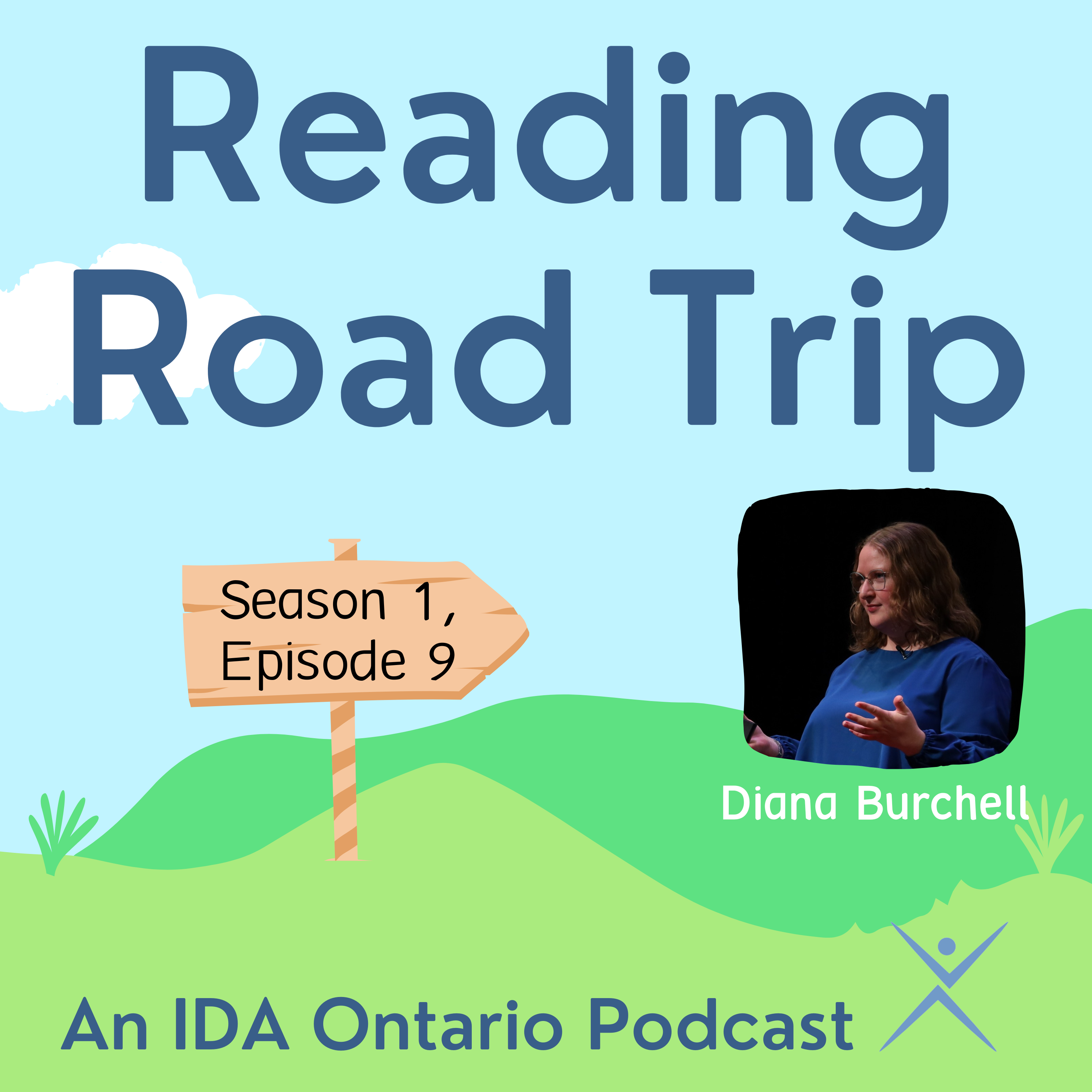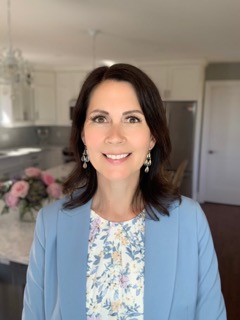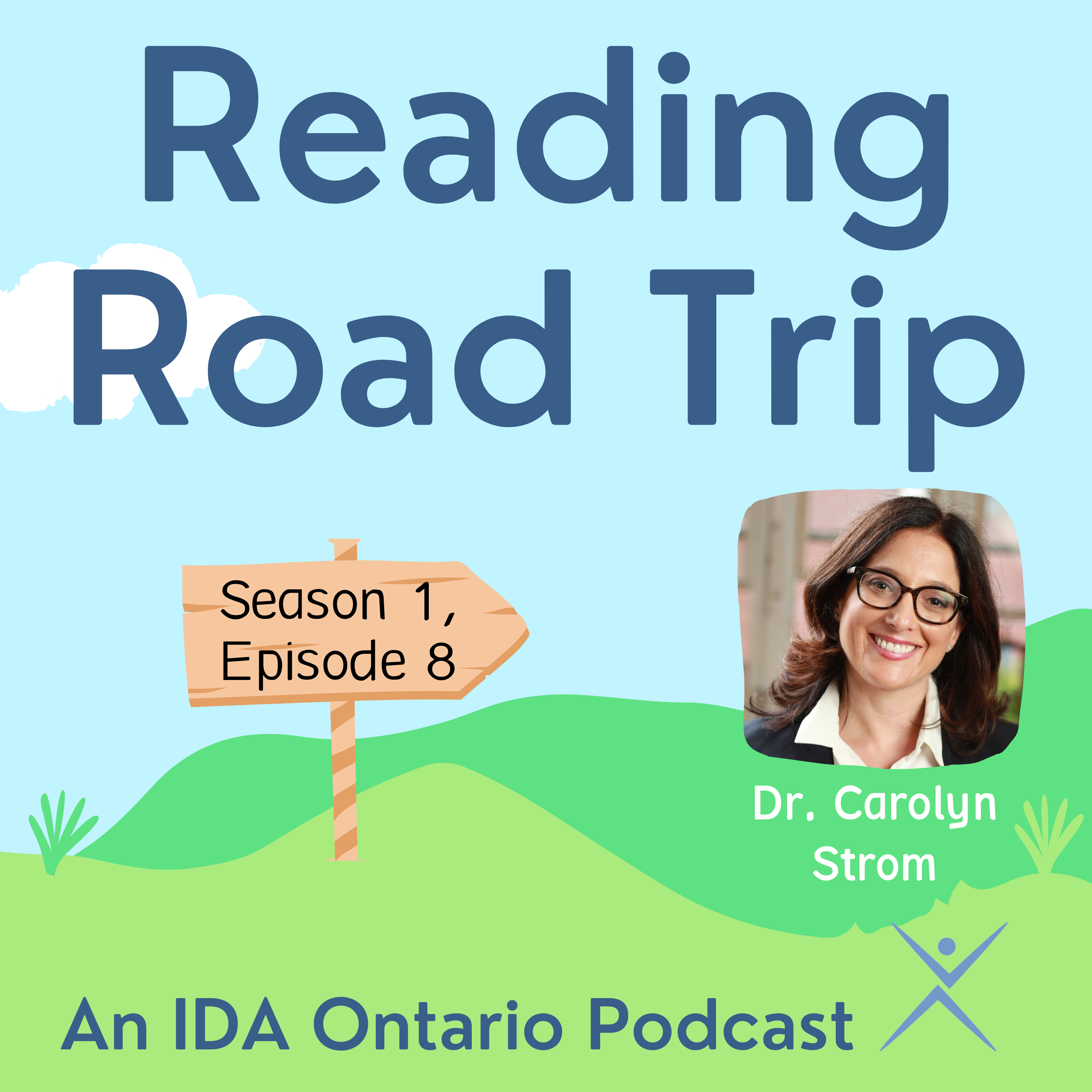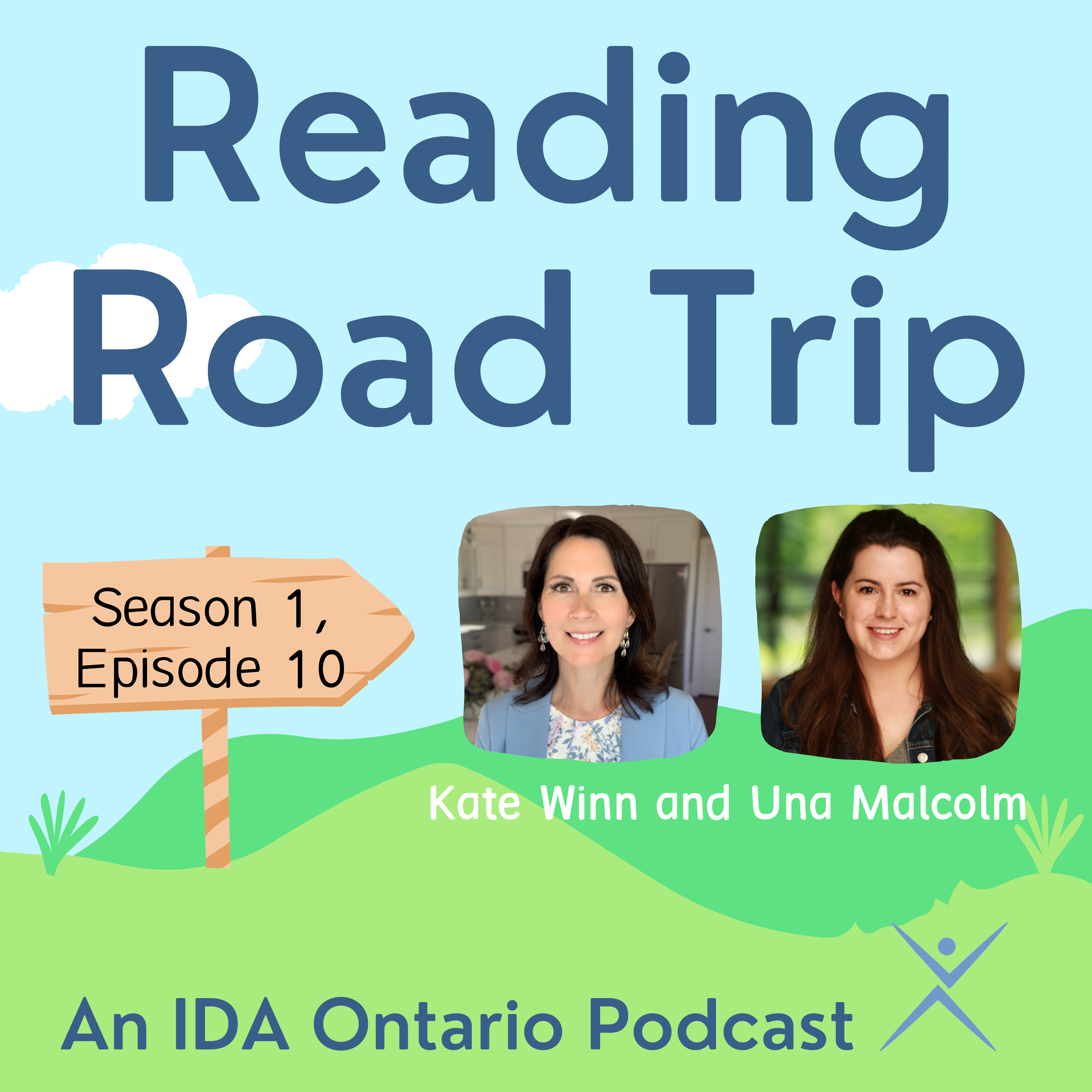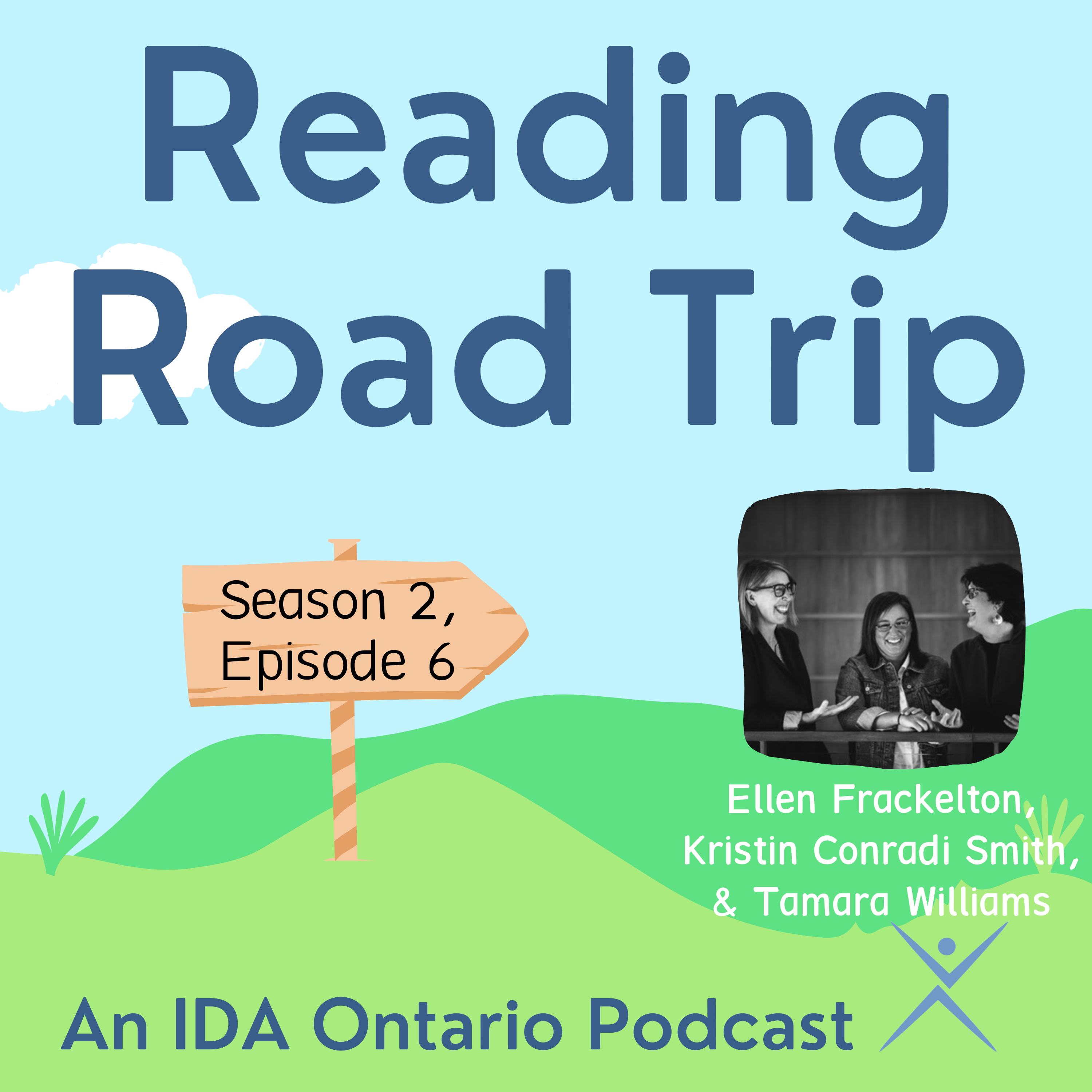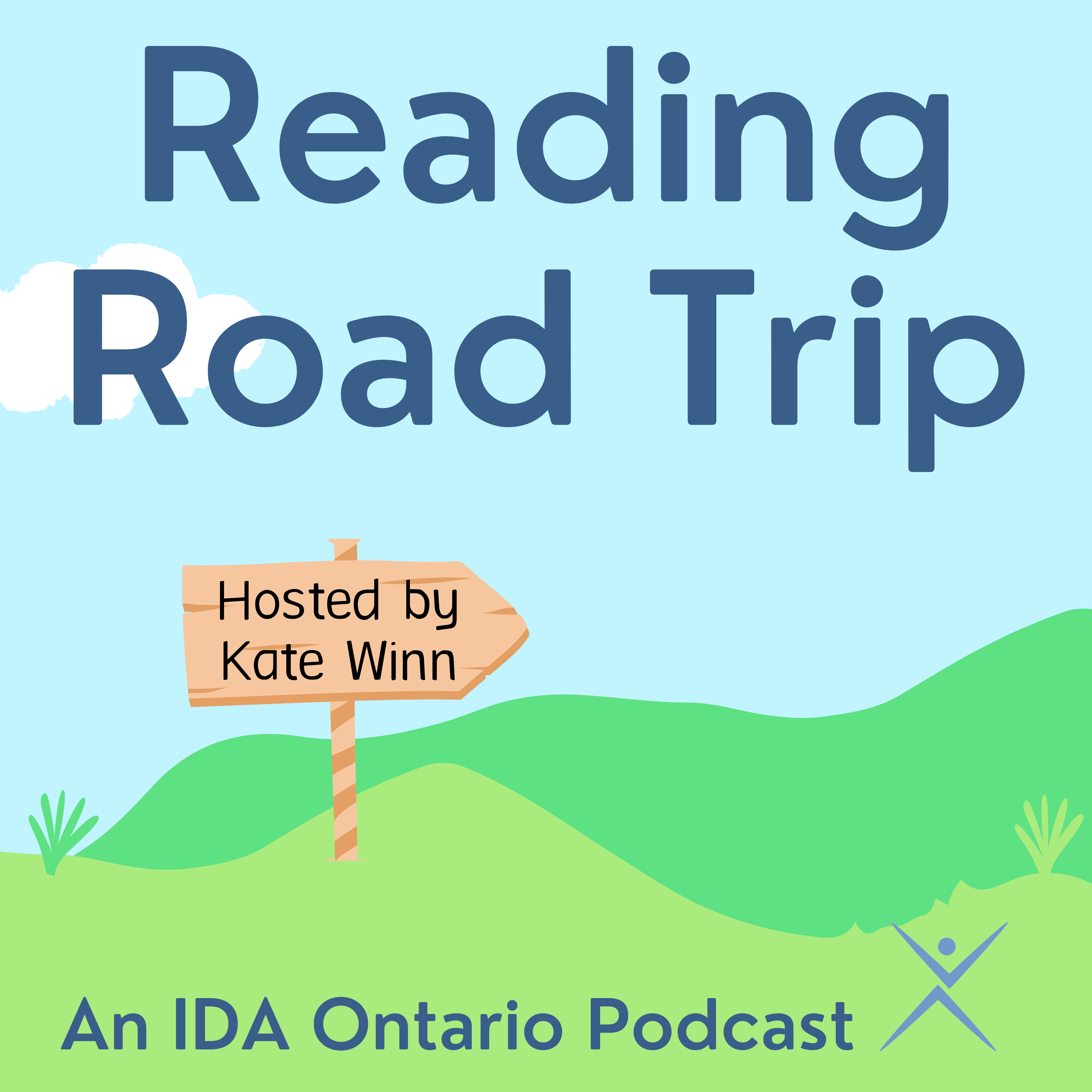Episode Transcript
Kate Winn 00:00:05 Hello to all you travelers out there on the road to evidence-based literacy instruction. I'm Kate Winn, classroom teacher and host of IDA Ontario's new podcast Reading Road Trip. Welcome to the show. This is episode nine of our very first season.
Before we get started, we would like to acknowledge that we are recording this podcast from the traditional land of the Mississauga Anishinabe. We are grateful to live here and thank the generations of First Nations people for their care for and teachings about the earth. We also recognize the contributions of Metis, Inuit, and other Indigenous peoples in shaping our community and country. Along with this acknowledgement and in the spirit of truth and reconciliation, we'd like to amplify the work of an indigenous artist. And this week we are sharing When We Were Alone by David A. Robertson illustrated by Julie Flett. When a young girl helps tend to her grandmother's garden, she begins to notice things about her grandmother that make her curious: why does her grandmother have long braided hair and wear beautifully colored clothing? Why does she speak another language and spend so much time with her family as she asks her grandmother about these things? She's told about life in a residential school a long time ago where everything was taken away. When We Were Alone is a story about a difficult time in history and ultimately a story of empowerment and strength. Add this book to your home or classroom library today and now on with the show.
Kate Winn 00:01:36 It is such a pleasure to introduce our guest here this week, Diana Burchell. She is a former French teacher now a PhD candidate with research focusing on assessing at risk and multilingual learners in French as a second language programs using dynamic assessment methods. There's so much in there that we are going to get to and thank you so much for being here with us today, Diana.
Diana Burchell 00:01:59 Thank you so much for having me. I'm so excited that this podcast is taking off and that we have a place to really discuss how Ontario education is transforming and growing in new ways and I'm just, I'm so happy to be here and be a part of it.
Kate Winn 00:02:13 That's wonderful. Let's dig right into, uh, to your area of expertise. So both your teaching career and your research career have been really focused on language learning. What would you say are some of the benefits of multilingualism and why might it be important for teachers to think of that linguistic diversity as an asset?
Diana Burchell 00:02:32 Oh, that's such a fabulous question because there are so many advantages. Um, the one I always start with is that language is much bigger than the linguistics itself. It's culture and identity. So for students in your classroom, we really wanna think about how language facilitates their identity development and how it really ties them into the cultures at home and in the school. Um, and that removing that actually really harms not just their language development, but their total academic development. So I always start with the big picture. That language is such a powerful vehicle for all of those really important things we think about like culture and identity. Um, but then I think additional advantages of bilingualism, I mean, we're in an officially bilingual country, um, so we're in a system that hopefully recognizes bilingualism, so it helps students when they're traveling if they wanna speak with other people.
Diana Burchell 00:03:29 Um, it helps with things like intercultural awareness. So being aware that the norms that happen in your culture are not always the same in other cultures. Um, and it also helps with things like when you're going for job interviews, the fact that you're able to use all these different languages, um, in your job setting. So, and that's also in addition to some developmental benefits, right? So the fact that we're learning to code switch at an early age that kind of can prime the brain to learn how to do that. There's still a lot of emerging evidence about multilingualism and executive functions. We're still kind of teasing that apart, but I think there is some really exciting new directions and how multilingualism really helps with, helps to teach our brains how to switch between different languages and then apply that to other scenarios. So yeah, tons of benefits. And I think the takeaway for me is always that negatives that come from multilingualism are usually due to our systems and the challenges we see, not from a child's ability perspective. I just think from the child perspective it's all benefits for them.
Kate Winn 00:04:36 We know that Ontario's home to incredible linguistic diversity that enriches our educational system. And I mean obviously other provinces and states have this too, but there are definitely considerations for research informed practices in the classroom. So in terms of those classroom teachers, what are some key points we should be aware of when teaching multilingual learners and are there any common misconceptions that you notice among educators?
Diana Burchell 00:05:00 Yes, and I'm glad we're chatting about this because I think one of the biggest myths I run into, um, and understandably because we didn't know for a long time, but teachers are never sure when parents ask if I have students that speak multiple languages, what should they be using at home? Um, we see this a lot in parent-teacher interviews, um, different Q and As at the school. Um, and for a while teachers weren't sure what to say, but we can now very strongly say that students should be speaking their first language at home. Uh, we know from a variety of research that students' first language development actually really informs how well they can learn other languages. So if they're not speaking that first language at home and they don't have a strong first language base, learning a school language gets so much more difficult. So I think one of the biggest takeaways I always say is encourage that first language in home language development as much as you can.
Diana Burchell 00:05:56 It's so, so crucial to their overall language development. Um, and that's something we can make clear to parents right from the first day of school, right? Whether that's in a newsletter, whether that's at those parent-teacher interviews or wider school communication. Um, I think that's very empowering for parents to know that we just want them to focus on their home languages and that's the best thing they can do for their kids. Um, the other thing I love teachers to learn about is how we use the strengths of students' home languages in the classroom. Um, so I think people think of, for example, English and French. They're both alphabetic languages. They have some overlap in vocabulary. So we think, oh, those languages might transfer, right? That students, if they're learning English, might use some of that to learn French. Um, but sometimes there's skepticism around other languages.
Diana Burchell 00:06:47 So if a child speaks a non alphabetic language, can that help them in the classroom? And we actually find that that does happen. So, um, giving an example, if you look at Chinese, which a lot of students in Canada speak Chinese, it's a very heavy morphological language. So students learn how to build really complex compound words. They're using those morphological roots. Um, and that actually really helps 'em when they're learning things like English and French. So I think for teachers to know that there are so many strengths that students come into the classroom with from their home languages, and if we know what those are that can help them then learn other languages. So I gave the Chinese example, um, also in a language like Spanish phonology is really important. So, um, students might have a really good base in phonology if they're moving from Spanish to English or French. So I would just do a little bit of research if you have different learners in your classroom, what are the strengths they might come from from those languages? And I think most of it's pretty readily available. So I think that could be a huge teaching, um, a huge teaching strength for teachers.
Kate Winn 00:07:59 And as I have learned more about research informed reading instruction, I've really leaned into the idea of that universal screening and progress monitoring in my classroom. But I, I'm assuming there are additional factors to consider when we're thinking about screening students who are also language learners. So, um, how can we tell if a language learner is struggling to learn to read or is simply developing proficiency in English? And then can we still screen those students who are language learners? How do they fit in, you know, in Ontario for example, when we have now mandated universal screening K to two, how do those multilingual learners fit in there? What can you tell us?
Diana Burchell 00:08:36 Oh, that's also such a great question. Um, so to give a bit of background, I think there has been some debate over universal screening. Um, I think it's really good that moving forward we do have this universal screening because historically we do have a past of missing students, right? Who need extra support. So I think having the ability to really see which students need support early is so important. Um, I think on the flip side with our multilingual learners in particular, there has been this past history of them being over-identified as either having a learning difficulty or some kind of reading disability, um, because they're only assessed in the target language, so it doesn't take into account their home language strengths. So, um, I'm not saying they shouldn't be screened, I actually think you can get really useful information from universal screeners with multilingual students.
Diana Burchell 00:09:29 But I also think that we do need to keep in consideration the bigger picture for those multilingual students. So if there is the ability to do any kind of screening in their other languages, that might give you a fuller picture. Um, and there are lots of ways to do that from community organizations, having parents help you translate, you can even talk to parents about what they're seeing at home. Um, so I, I think we do need to keep those other pieces in mind just to make sure we're not over identifying those students. Um, and the other thing I always say to people is we have to keep in mind that there are specific aspects of a language that may be slower to develop. So the big one is vocabulary. So some of those bases of a language such as phonology, morphology, orthography, syntax, those tend to pretty much transfer from one language to another.
Diana Burchell 00:10:24 So if we're looking to see if a student struggles, you should see that they're competent in those skills across most languages. Um, even if they have some catching up to do in those areas, for the most part that does transfer. Where we might see a delay is vocabulary development. Um, just because that's independent to the language for the most part, and it does take time to memorize all these new words. So I think we need to prioritize looking at some of their skills, like phonological awareness, morphological awareness, instead of just looking at their vocabulary scores to make sure that we're not over identifying them. Um, and the final thing I kind of lean back on is a lot of screeners rely on prior knowledge. So they look at what students know before they come into the screener. Um, and this is a great first test because it's quick, we can do it easily in the classroom. Um, but if we're not sure whether a student is struggling based on that screener, we might wanna look at how well they're learning new things. So we tend to look at instead of what they already know, if we teach 'em something new, are they able to pick it up as quickly as the rest of the students? And that measurement of learning potential actually tells us a lot of really good information.
Kate Winn 00:11:47 So I know that you are, you know, researching and involved in something called dynamic assessment, and that is something I had not heard of before. Are you able to just give us a little bit of a picture of what dynamic assessment is and how that works?
Diana Burchell 00:12:02 Absolutely. Um, so the term dynamic typically is contrasted with the term static. So when we talk about static assessments, it means that they are pure assessments in the sense the goal is to assess how the students are doing, and they're generally based on what students already know. So a good example of that would be a vocabulary test where we ask them to identify some pictures and know if, see if they know how to match with the words. Um, that would be kind of a typical static assessment, a dynamic assessment on the other hand, infuses teaching into the assessment process. So, um, a good example would be teaching students to recognize either new real words or what we call pseudo words or non words, which are just words that are targeted that we wanna see if they can learn. So they're learning some sort of new material.
Diana Burchell 00:13:02 Um, and we can do this either through repeat exposure, so they see this new word in, for example, a storybook that they're reading, um, or we can teach it a little more explicitly by giving them contrast with different words. So can they learn to contrast the new word versus words they already know? Um, there are multiple ways to do it, but the key idea is that we teach the students the new information and then we assess them based on how well they've learned that new information. Um, and we find that that works especially for students who are coming in from marginalized backgrounds because it takes into account the fact that students have different backgrounds and may have had different opportunities to learn prior knowledge, um, and therefore just relies on how well they're able to learn on the spot in the classroom. Um, the only thing we're still kind of investigating, we do think this can be muddied a little bit by some of students' skills.
Diana Burchell 00:14:01 So for example, because there's a teaching component, we do think it relies on their memory a little bit more because they're learning something new and then having to repeat it usually within the same timeline. Um, so we're still looking into how memory could affect that attention can affect it as well, because if students are having trouble paying attention to the things they're being taught that might affect their scores, um, and other executive functions. So I'd say that's where the research is going really. We really wanna understand how memory and attention of those things might affect dynamic assessments, but overall we hope they might be a little more equitable for our diverse students.
Kate Winn 00:14:43 So the, the timing was perfect that right before we had this interview, I was actually reading a chapter in The Handbook on the Science of Early Literacy, which is edited by Sonia Cabell, Susan Neuman and Nicole PattonTerry. And it's a chapter called Literacy Architectures: Making the Case for Systems of Learning and Teaching to Cultivate Readers and Writers in Linguistically Diverse Schools. And the authors of that chapter were Emily Phillips Galloway and Noni Kay Lizzo. And one of the findings that they had in that chapter that I thought was really interesting for us to, to mention, um, I'll just quote from there. It said, “in the presence of high quality instruction, multilingual readers develop code-based skills in English on a similar timeline as monolingual beginning readers.” And then their corresponding instructional principle to go along with that is “MLLs needs systematic intensive word reading and spelling instruction as part of the instructional core, ideally integrated with meaning based instruction.” So to me that really gives the, um, the idea of what the right to read is all about and um, wanting that sort of foundational skills piece that is good for MLLs too. But I'm also wondering, you know, is there anything that's different for MLLs with that code piece and how we should teach it? And also with that meaning based side of literacy instruction, and I'm thinking things like vocabulary which can actually support both sides of, of that reading rope.
Diana Burchell 00:16:09 Yeah, I am, that is so timely that you found that chapter and I think there is so much wisdom, um, in what you quoted there and so much we could dig into as well. Um, I think one of the things we wanna keep in mind with multilingual learners, um, and they mentioned this in the quotation, is how important it is to teach code-based instructions. So things like vocabulary in a structured way, but also a logical way. Um, I think it's easy for us as teachers because we're not given sometimes explicit strategies on how to teach vocabulary, um, to teach it in a non-structured way, such as as it comes up in books or in media or based on student interests. Um, and the only difficulty with this for students, um, is that they're not learning to make connections between the words as they go. So they're learning all these individual words, um, and trying to memorize the meanings, but that's actually very cognitively task taxing to always have this memorization component.
Diana Burchell 00:17:15 Um, what we are hoping will happen instead in this new structured literacy is to teach how words are connected. And we do do some of this in schools already, but I think we could really strengthen it by teaching students, for example, aspects of morphology so that there are root words in a lot of words that we have prefixes and suffixes. Um, we can then teach them word families. So how do words relate to each other? Um, how does a suffix affect the actual function of a word? So how do you change a noun into a verb and does that happen systematically? Um, and when we have this kind of logical sequence, this structured literacy, it helps students to what we call organize their schema. So it helps 'em to build this mental representation of all of these words that they're learning and how they're connected and also how they can manipulate new words.
Diana Burchell 00:18:13 For example, if they learn a new noun, can they figure out how to make it into a verb? I think overall for code-based instruction, um, we want to really have what we call scope and sequence. And most school boards do have this so that we know the appropriate developmental pace to learn new things. So when are we introducing, for example, aspects of phonology, morphology, syntax and orthography, um, but also how do we build it up so that they have all their prerequisite skills as they're learning new skills. Um, so with multilingual learners, all of that is very similar. I think what we need to keep in mind is because vocabulary learning is so challenging as you're learning multiple languages, it's even more important to have a sequence to how we teach vocabulary, um, to do it in a way in context so that they can associate all the vocabulary with meaning, which always helps us to store it in our memory. Um, and that we take into account they are learning multiple languages, and if we can make connections between those languages, that will strengthen their memory even more so. So if we can find words that overlap, concepts that overlap, if they can do any of that analysis, that will also help them with their memory storage of vocabulary.
Kate Winn 00:19:33 You are clearly very passionate about learning about language and literacy within the French immersion context too. Attrition can be a significant issue in French immersion placements. We know many systems, um, and even individual parents who report things about struggling readers leaving the French immersion stream and switching to English. So how can early French immersion programs be optimized to address and hopefully even prevent French immersion students from leaving the program? What are your thoughts on that?
Diana Burchell 00:20:05 I love that you brought this up. My background is as a high school French immersion teacher. Um, and I decided to go back to school because I saw so many students who were having to leave French immersion because they'd missed sometimes up to 10 years of assessment and intervention. Um, and it was just such a wide gap by then. It was really hard to help them get back on track and to feel like they were learning at a, at a rate that was the same as their peers. And I did see a lot of students leave. So, um, I think we really do need to look at those early foundations in French immersion and how we can better support students. Um, we know for example, in some school boards that up to 70% of students have left the program by grade nine, um, which is a really high number.
Diana Burchell 00:20:55 And that is something we would hopefully start to work on as we do this structured literacy. Um, and I think one of the big ways we do that is systemic support. So some of that will be at the classroom level. We have kind of these early screeners. We have a new, um, curriculum that's being developed and coming out, um, and all of those things will help in the classroom. And then I also think we need better kind of official assessment services. So, um, in my dissertation, I actually talked to many parents about their assessment process and they said they were told it was often up to a three year wait, which is far too late for students to get good, um, intervention. And if they didn't wanna wait three years, they would pay $3,500 for that assessment, which got them access to immediate services. So, um, I think we see from that where French Immersion gets this reputation as an elitist program because the students who stay in the program generally are those whose parents can pay for assessments if they need them, whereas students who need assessments but need to wait the three years often end up leaving the program because they think it might be too cognitively demanding for their child to continue without accommodations for three years.
Diana Burchell 00:22:18 So that's all kind of contributing to this attrition problem we see. Um, and I really think the key to that is early assessment intervention, like we've talked about. Um, and so those universal screeners and diagnostics are fabulous. I'm hoping we get more, like I said, systemic supports. Um, and I really hope we just move away from that wait and see model, which we have a lot in French immersion, the waiting until at least grade three or four to see if they catch up. Um, we know that the earlier they get support the better. Um, and we also know that this early assessment and intervention can happen in all languages. Um, so like we know if students have a strong first language base or home language base that will help them in further languages. So even providing great support in English or other home languages in French immersion is going to ultimately help with their language development. So we have a lot of resources available, um, but we do need, I think a more systematic approach to str to, uh, supporting students in French immersion.
Kate Winn 00:23:28 You are in Dr. Becky Chen's lab at the University of Toronto, which is a world renowned source for multilingualism and literacy research, and your lab has some really interesting projects on the go. Would you be able to share a bit about what your team has learned in your research working with refugees from Syria?
Diana Burchell 00:23:46 Absolutely. Um, so like you said, I am so blessed to be working with Dr. Becky Chen. She really is, um, kind of a, a driving force in our Canadian multilingual research. Um, and I really wanna mention one of her former students who's now doing some amazing school board research. Um, Dr. Redab Al Janaideh she did a lot of this, um, research with Syrian refugee students. So if people wanna look Dr. Redab Al Janaideh’s work up, I can post that, um, in the show notes. Um, but we saw a few really key things with those students. One actually reinforces all of our talk about how important home languages are. So a lot of refugee students, because they were escaping a war zone, had interrupted schooling. So some of them for less time, particularly the younger students, a lot of the older students would have larger gaps in interrupted schooling. So that could be four or five, six years where they were not in any kind of formal instruction.
Diana Burchell 00:24:49 Um, and we saw that that really, um, affected their language learning and we saw actually that it was the strongest in the students whose Arabic was struggling the most. So for students who didn't have a large gap, they had learned Arabic regularly when they were coming in to learn English or French, they didn't seem to struggle as much. They were picking up new concepts. They were able to pick up vocabulary, um, for students who were missing some of that schooling and who might struggle with some of, um, those language acquisition pieces in Arabic, it actually really, um, affected their English and French acquisition. So that just reinforces how important that home language base is. It really gives 'em the building blocks to build off of. Um, and the other thing we really saw is the importance of mental health. So there is a lot of new awareness about how important mental health is in the classroom.
Diana Burchell 00:25:48 Um, I always give the example, we've given some workshops for teachers about this, that if you imagine your body has been in fight or flight road for five to six years, you're constantly monitoring for threats. You're on the go all the time, you're used to being very active and then all of a sudden you are safe in a classroom, but you have to sit still for eight hours a day. It's such a jarring juxtaposition, right? To go from this constant activity, constant movement to now just sitting still in the classroom. Um, and I think any of us would find it understandable that that would be difficult to switch the way your brain's been wired to be constantly active, constantly monitoring. So that's one of the things we see with students who have either an official kind of post-traumatic stress syndrome or even students without the formal diagnosis, but are making huge shifts in their environment. Um, so those are the two things we really emphasize. One is that we need to keep interrupted schooling in mind and see how we can help students with their Arabic development, but also that if students are feeling dysregulated in the classroom, if they aren't feeling safe, if they have um, undiagnosed mental health concerns, all of that is going to really affect their language learning. And we have to deal with the mental health first before anything else can happen.
Kate Winn 00:27:13 And that's the case with, with so many things, right? That mental health piece being, being so important and, and coming first. Um, switching to something a little bit unrelated, but I wanted to ask you about your experience in teaching teachers. So you have taught pre-service teachers as well as teachers pursuing a master's degree or certificate. And what I'm noticing in the profession is a lot of excitement for teachers as we all learn more about research informed reading instruction, but also sort of some of that disappointment, frustration that we might not have received it, you know, 23 years ago in our, our pre-service training and so on. <laugh>, what are you noticing in your work with, with teachers right now in terms of all of this, uh, great literacy stuff going on?
Diana Burchell 00:27:57 Yeah, you're right, it's such a mixed bag. I think the overwhelming thing I first see is that teachers are just overwhelmed. Um, particularly because we've had a new curriculum come out in the last week of school that teachers wanna feel ready for in September. So I just wanna establish, I totally understand how overwhelming this is all to learn all this new information to make sure teachers feel comfortable for September. Um, so I think acknowledging that is important so that teachers don't feel alone that they're the only ones struggling with this and kind of building those professional communities so that we can support each other as we learn. Um, the thing I've loved in working with both pre-service and current teachers, um, is the growth mindset we really see in teachers right now. So I've had so many teachers say to me that, like you said, they really struggle with the fact that they didn't have this learning.
Diana Burchell 00:28:54 And I've had teachers say to me, you know, I always wanted to do the best for my students, and what if I haven't done that? Um, which is a difficult thing to reckon with, but I always come back to that quote that when you know better, you do better. And I do think our teachers are really embracing that growth mindset that, uh, we did the best we could at the time with the knowledge we had, and that's okay. We don't have to have tons of guilt over that. But it's also true that now that we know better, we do have a duty to do better for our students. Um, and I think there's a lot of things that go hand in hand with that. One of that is needing really strong leadership so we know who to go to, who to ask questions so that we have available training. And I think a lot of that is starting to roll out now. Um, I also think peer support is so important, whether that's through like social media groups, whether that's um, school teams, um, whether that's finding your own kind of groups online. Um, I think this is a time we really need to come together and learn from each other so that we're not all feeling so overwhelmed with the new information.
Kate Winn 00:30:00 Absolutely. I think overwhelmed is, is a great word to use. I know when I started learning about, uh, about the science of reading as, as it's called, it was very overwhelming and thinking about how that needed to impact my classroom practices and how it should have impacted previous classroom practices and kind of some of those students that you still wake up thinking that you could have done better for if you had known better, but, but you've got that perfect, uh, that perfect Maya Angelou line, right? When you know better, you do better. And so that's, that's certainly what we are trying to do. Now. The last thing I just wanna ask you, Diana, is is there anything that you're working on right now, a project you wanna share, anywhere you'd like to direct listeners to find your work?
Diana Burchell 00:30:36 Sure, absolutely. So I'm in a bit of a transition, so maybe I'll direct people in two places. So the multilingualism and Literacy lab under Dr. Becky Chen at the University of Toronto is fabulous. I've been so blessed to do my master's in my PhD there. Um, and I would absolutely look into the work that's, uh, has happened and is still happening. I think that's a great place to start. Um, I'll also be joining the Multilingual Families Lab in Edmonton at the University of Alberta under Dr. Andrea McLeod. Um, and she's also doing some fabulous, fabulous research, uh, research on multilingual families. Um, my next direction is really going to be looking at, uh, motivation to read and how that affects our students as well as the language confidence to anxiety spectrum. So how we help students to feel more confident, less anxious about learning new languages. Um, and all of that's gonna be happening in conjunction with both Dr. Becky Chen and Dr. Andrea McLeod. So I would say those two are, I'd say my models and leaders and uh, the people I look up to in this field. And I would encourage people to look up both of their work.
Kate Winn 00:31:53 Amazing. And that work all sounds so exciting. And we know that being able to, to reach our multilingual learners and give them the, uh, the education that they deserve is so important. Thank you for doing this work and research and and everything that you do in your day-to-day. And thank you very much for being here with us for this episode of Reading Roadtrip, Diana Burell. It's been such a pleasure to talk to you today. Thanks again.
Diana Burchell 00:32:16 Thank you for having me.
Kate Winn 00:32:20 Show notes for this episode with all the links and information you need can be found at podcast.idaontario.com. And you have been listening to episode nine with Diana Burchell. In this episode, Diana mentioned vocabulary building and we know how important that is for literacy for our multilingual learners and for all students along with background knowledge as well. And when kids are really young, they can't yet get that from their independent reading. And so that's something that we can provide for them as teachers, as parents. And I like to take advantage of snack time in our kindergarten class for chapter book read alouds. So in the shownotes for this episode, we're going to share a link to a blog post where I have listed all of the chapter books that I have read to our kindergarten class over the past couple of years and would recommend, and these are great for bedtime reading with younger kids as well, if you're looking for something for home.
Kate Winn 00:33:11 And now it's time for that typical end of the podcast call to action. If you enjoyed this episode of Reading Road Trip, we'd love it if you could rate and or review it right there in your podcast app, Apple Podcast, Spotify, et cetera, as this is extremely helpful for a podcast. And of course, we welcome any social media love you feel inspired to spread as well. Feel free to tag IDA Ontario and me. My handle is thismomloves on Twitter and Facebook and Katethismomloves on Instagram. Make sure you are following the Reading Road Trip podcast in your app and watch for episodes continuing every Monday through the summer. We couldn't bring Reading Road Trip to you without Behind the scenes support from Katelyn Hanna, Brittany Haynes and Melinda Jones at IDA Ontario. I'm Kate Winn and along with my co-producer Una Malcolm. We hope this episode of Reading Road Trip has made your path to evidence-based literacy instruction just a little bit clearer and a lot more fun. Join us next time when we bring another fabulous guest along for the Ride on Reading Road trip.
